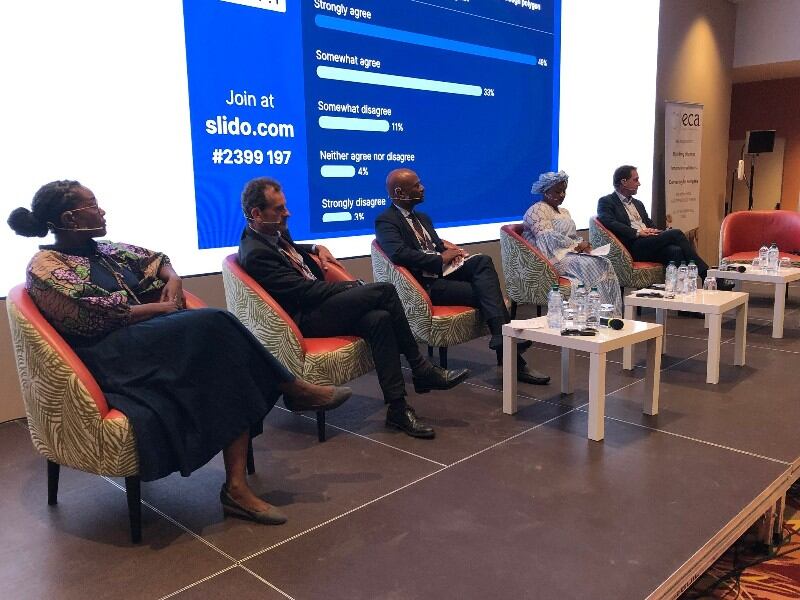While the forthcoming European Union regulation is designed to protect citizens with a guarantee that the products they buy are not contributing to destroying forests around the world, the cocoa sector is well aware that it has to become more transparent in the whole of its supply change, with strict traceability linking a plot of land from where the cocoa beans originate from.
New due diligence rules imposed by the EU will be applicable to all operators, and delegates heard discussions are ongoing with individual countries including Cote d’Ivoire and Ghana, the two biggest cocoa producers, to create a benchmark system within the legal framework of their governments.
The future of chocolate depends on the people in this room -- Selassie Atadika, a Ghanaian chef
In a keynote address to the Forum, Laurent Tchagba, Cote d’Ivoire Minister of Waters and Forests, said his country is already slowing down the levels of deforestation with a series of measures implemented by his government. He said the EU regulations have advantages but more measures are needed to help cocoa-growing communities and welcomed the EU’s cooperation agreement with partner countries.
Cote d'Ivoire’s progress was called out by Alan Belward, Acting Director, Joint Research Centre at the European Commission, who said the numbers were “immensely encouraging.”
He told delegates that this week the European Council, EU Parliament, and the European Commission are sitting down to thrash out differences between the three legislative bodies, before announcing when the new law will come into force.
Gerry Manley, ECA Board Member and Chief Executive Officer of OFI Cocoa described cocoa as a “positive crop” but the important element of the discussions in Rome is how to get the message to the farmer.
The Forum concluded with the Chocovision session. Previously a standalone conference, Chocovision was included as an integral part of the ECA Forum for the first time in Rome and brought together key stakeholders and senior business leaders in the cocoa and chocolate industry to explore traceability measures to drive a sustainable chocolate supply chain.
In a keynote speech Selassie Atadika, a Ghanaian chef who uses cocoa as a key ingredient said the industry, “can’t afford to fail, and needs to act now. The future of chocolate depends on the people in this room,” she said.
In her opinion, cocoa brings value, but growing the crop, is labour-intensive, involves a lot of manual work, and with the trees getting smaller and older, the yields are getting smaller so there is no incentive for young people to work in cocoa when they see their parents struggling to make a living.
Climate change
The forum heard that farming methods are out of date, generalized, and static and need to be updated to tackle climate change with collaboration, investing in farmers, re-training, and new technology.
Atadika said there needs to be a new narrative, a better story, for Ghanian cocoa beans, which she believes are the best in the world due to the unique growing conditions of the terroir
She also made the point that making chocolate in Ghana is not cost-effective as she would have to pay the same price for the cocoa as large chocolate companies, buy sugar and imported milk, and then factor in energy and fuel, and export costs.
Musah Ibrahim, a cocoa farmer and purchasing clerk in Ghana, urged the Chocovision roundtable to not place the burden of new legislation on the farmers. “The burden should be on producers and consumers.” In a video, delegates also heard from a Ghanaian cocoa farmer, who made the argument for government help with pensions and social security for when they become too old to work.
The roundtable discussion ended with a closing intervention from Peter Boone, Chief Executive of Barry Callebaut, who threw the group’s considerable weight behind proposals for more industry collaboration on traceability in the cocoa sector.
“We have to move forward and raise the bar,” he said, “and make sure that the traceability system is fit for purpose, this will require a shared vision.”
In his closing remarks, Paul Davis, ECA President and Head of Cocoa at the Sucden Group, said: “Regulations should be a driver of change, cooperation drives efficiency, that will keep farmer prices strong with no conflicting regulation ... we have to be good at what we do. This Forum has brought people together, shared ideas, and the contribution over the last two days from all the contributors has been exceptional.”

